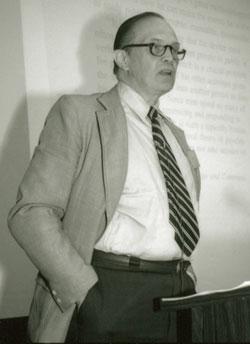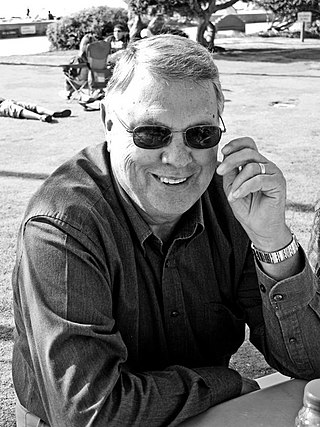External links
| General | |
|---|---|
| National libraries | |
| Other | |
| | This Texas biographical article is a stub. You can help Wikipedia by expanding it. |
David J. Schneider is an American psychologist. He is a professor of psychology and the director of the cognitive sciences program at Rice University.
Schneider's most important published work deals chiefly with cognitive psychology and organizational psychology, especially bias, prejudice, and discrimination.
Schneider received his Bachelor of Arts degree in philosophy and psychology cum laude from Wabash College in 1962, and his Ph.D. in social psychology in 1966 from Stanford University. Positions held include:

George Armitage Miller was an American psychologist who was one of the founders of cognitive psychology, and more broadly, of cognitive science. He also contributed to the birth of psycholinguistics. Miller wrote several books and directed the development of WordNet, an online word-linkage database usable by computer programs. He authored the paper, "The Magical Number Seven, Plus or Minus Two," in which he observed that many different experimental findings considered together reveal the presence of an average limit of seven for human short-term memory capacity. This paper is frequently cited by psychologists and in the wider culture. Miller won numerous awards, including the National Medal of Science.
Robert Duncan Luce was an American mathematician and social scientist, and one of the most preeminent figures in the field of mathematical psychology. At the end of his life, he held the position of Distinguished Research Professor of Cognitive Science at the University of California, Irvine.
John Robert Anderson is a Canadian-born American psychologist. He is currently professor of Psychology and Computer Science at Carnegie Mellon University.
Raymond F. Hopkins is an American political science professor and expert on food politics and food policy. Hopkins taught at Swarthmore College from 1967 until his retirement in 2007, where he was the Richter Professor of Political Science.
Philip Nicholas Johnson-Laird, FRS, FBA is a philosopher of language and reasoning and a developer of the mental model theory of reasoning. He was a professor at Princeton University's Department of Psychology, as well as the author of several notable books on human cognition and the psychology of reasoning.

Justin Fritz Leiber was an American philosopher and science fiction writer. He was the son of fantasy, horror and science fiction author Fritz Leiber and the grandson of stage and film actor Fritz Leiber, Sr. Previously a professor of philosophy at the University of Houston, Leiber was most recently a professor emeritus of philosophy at Florida State University. He was a visiting fellow at Linacre College, Oxford during the Trinity term on numerous occasions.
Richard Shiffrin is an American psychologist, professor of cognitive science in the Department of Psychological and Brain Sciences at Indiana University, Bloomington. Shiffrin has contributed a number of theories of attention and memory to the field of psychology. He co-authored the Atkinson–Shiffrin model of memory in 1968 with Richard Atkinson, who was his academic adviser at the time. In 1977, he published a theory of attention with Walter Schneider. With Jeroen G.W. Raaijmakers in 1980, Shiffrin published the Search of Associative Memory (SAM) model, which has served as the standard model of recall for cognitive psychologists well into the 2000s. He extended the SAM model with the Retrieving Effectively From Memory (REM) model in 1997 with Mark Steyvers.
Eugene Webb is Professor Emeritus in the University of Washington Henry M. Jackson School of International Studies. Webb holds a Ph.D., in Comparative Literature from Columbia University (1965), an M.A. in English Literature from Columbia University (1962) and also a B.A., in Philosophy from the University of California, Los Angeles (1960). Webb was a member of the faculties of both the Comparative Literature Department and the Henry M. Jackson School of International Studies, where he served as Associate Director and chaired programs in both Comparative Religion and European Studies (1994). Webb was also the founder of those two programs: Comparative Religion in 1974, and European Studies in 1994. He retired from the University of Washington in 2000, where he now has the title Professor Emeritus of International Studies. Webb has two books on the novels and plays of Samuel Beckett, and has authored the books The Dark Dove: The Sacred and Secular in Modern Literature (1975), Eric Voegelin, Philosopher of History (1981), Philosophers of Consciousness (1988) and The Self Between: From Freud to the New Social Psychology of France (1993), all published by the University of Washington Press. His book World View and Mind: Religious Thought and Psychological Development was published by the University of Missouri Press in 2009, and his In Search of the Triune God: The Christian Paths of East and West was published by the same press in 2014. Webb translated and wrote the introduction to Jean-Michel Oughourlian's, The Puppet of Desire: The Psychology of Hysteria, Possession, and Hypnosis,. He also translated a second book by Oughourlian, The Genesis of Desire, published by Michigan State University Press in 2010.
Michael Haygood Schneider Sr. is a former United States district judge of the United States District Court for the Eastern District of Texas.

David Klahr is an American psychologist whose research ranges across the fields of cognitive development, psychology of science, and educational psychology and has been a professor at Carnegie Mellon University since 1969. He is the Walter van Dyke Bingham Professor of Cognitive Development and Education Sciences at Carnegie Mellon University and a member of the National Academy of Education, a Fellow of the American Psychological Association, a Charter Fellow of the Association for Psychological Science, on the Governing Board of the Cognitive Development Society, a member of the Society for Research in Child Development, and the Cognitive Science Society. He was an associate editor of Developmental Psychology and has served on the editorial boards of several cognitive science journals, as well as on the National Science Foundation's subcommittee on Memory and Cognitive Processes, and the National Institutes of Health's Human Development and Aging Study Section.

Keith Rayner was a cognitive psychologist best known for pioneering modern eye-tracking methodology in reading and visual perception.
Jung-Mo Lee is a South Korean cognitive psychologist and cognitive scientist. His main areas of study include language, human memory, history of psychology, and foundations of cognitive science. He received his PhD in memory and language from Queen's University, Ontario, Canada in 1979. He currently is a Professor Emeritus at Sungkyunkwan University in Seoul.

Norman N. Holland was an American literary critic and Marston-Milbauer Eminent Scholar Emeritus at the University of Florida.
Wayne Harold Holtzman was an American psychologist best known for the development of the Holtzman Inkblot Test. Holtzman received a master's degree from Northwestern University and a doctorate from Stanford University. He worked at the University of Texas at Austin from 1949 until he retired in 1993. He developed the Holtzman Inkblot Test to address deficiencies in the Rorschach test.
H. Carl Haywood was an American psychologist who researched motivational influences on learning and development, intellectual and cognitive development, cognitive education, learning, neuropsychology, and dynamic/interactive assessment of learning potential.

Gelia Tagumpay Castillo was a Filipino sociologist. She specialized in rural sociology and was a pioneer of the concept of participatory development. She was a university professor at the University of the Philippines Los Baños. Her 1977 book Beyond Manila examined rural development in the Philippines. She was named a National Scientist of the Philippines in 1999.